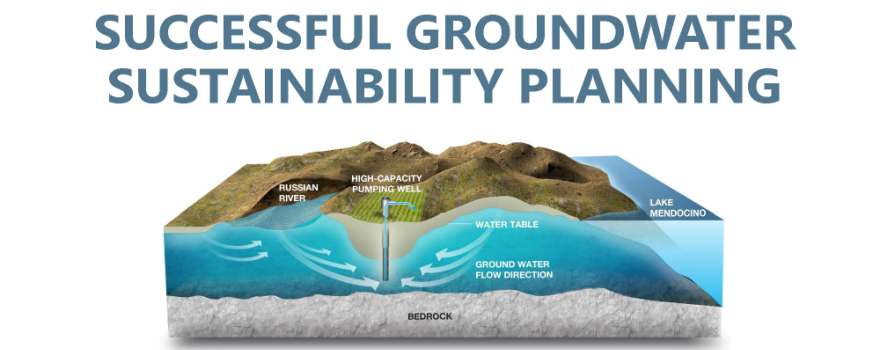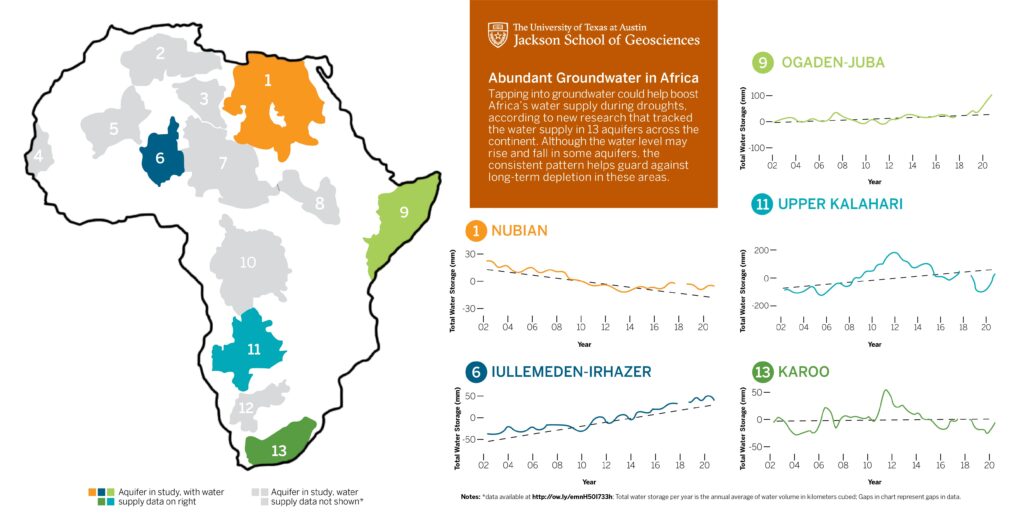In recent years, there have been increasing voices of the use of groundwater as a solution to Africa’s water scarcity crisis. Some argue that a better management of groundwater could change the agriculture industry and power economic development of Africa (The Guardian, 2022).
But is this all true? Are there any concerns associated with groundwater usage?
Groundwater refers to water that is found underground in between fractures of soil and rock. It is a part of the natural water cycle that is recharged through infiltration. Undeniably, Africa has abundant groundwater resources, totalling 0.66 million km³ (Xu et al. 2019). The map below shows the 13 major groundwater aquifers in Africa.
Many studies therefore urge that the continent should make better use of this hidden resources, such as extracting it for crop production. The United Nation’s World Water Development Report pointed out that only 5% of farmland in sub-Saharan African uses groundwater for agriculture, even though storage is abundant in the area (UNESCO, 2022). Besides, a study by Water Aid and British Geological survey predicts that the reserve is enough for the continent to survive 5 years of drought (Water Aid, 2022). It seems that groundwater could be a lifesaver for many African nations, yet its potential is mostly untapped. However, is that a catch with groundwater?
First of all, it should be noted that the amount of groundwater depends on the balance of deposits to withdrawals. Precipitation and land cover play an important role in determining the recharge (Vries & Simmer, 2002). Countries in North Africa, such as Egypt, Algeria and Libya, have little rainfall and therefore very low recharge rate (MacDonald et al. 2021).
They may be a solution to short-term drought, but in the long-run, groundwater may become unrenewable if we over-exploit. Unrestricted use, combined with low recharge rate, will lead to a lowering water table and thus depletion. In addition, groundwater is also facing threat of contamination from increasing urban, industrial and mining activities, as well as poor sanitation practices (Sorensen et al. 2015).
In order to fulfill the potential of this hidden and little appreciated resource, sustainable groundwater management is integral. Strategies to understand groundwater storage and distribution, as well as to monitor their amount is required. Yet, there isn’t a lot of data to facilitate local government and groundwater users to make decisions. Technology may be helpful as a solar pump imitative by British firm Futurepump has helped thousands of small-scale farmers in Africa to collect data about their groundwater reserves (Reuters, 2019). These high-tech solar pumps are equipped with sensors to record data such as water extraction rates, so that local users and governments can make better decisions, such as shifting to less water-intensive crops when storage is low. This pilot project has been rolled out in 15 African nations and received positive feedbacks in assisting sustainable groundwater use.
Another challenge would be the low education level of local residents, especially in parts of the primitive Africa, that may result in irresponsible over-use. Such situation had happened in India where the rampant use has caused groundwater to be drained and lose its natural ability to recharge. As a result, investment in education is key. Public participation should be advocated, so that the locals are given both the rights and responsibilities of this valuable water resource, which encourage them to use responsibly.
Groundwater can be a key to tackle Africa’s water scarcity and hence food insecurity, but only with sustainable management and consumption practices.




Comments
Post a Comment